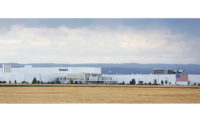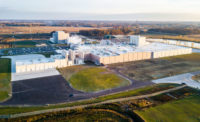Because our roots are planted deep in the natural and organic foods movement, WhiteWave Foods has always been dedicated to providing consumers with nutritious, innovative and responsibly produced foods. For us, this means not only producing products that consumers want and need – such as Silk, Horizon, International Delight, Fruit2Day and Land O Lakes products – but doing so in ways that are environmentally responsible.
Because our roots are planted deep in the natural and organic foods movement, WhiteWave Foods has always been dedicated to providing consumers with nutritious, innovative and responsibly produced foods. For us, this means not only producing products that consumers want and need – such as Silk, Horizon, International Delight, Fruit2Day and Land O Lakes products – but doing so in ways that are environmentally responsible.
At WhiteWave, we believe that investing in sustainable business practices is worth the effort. When implemented correctly, such initiatives can result in cost savings, increased efficiency and reduced environmental impact. In short, we have found that taking care of business and taking care of the planet can go hand-in-hand.
We have focused a great deal of energy in reducing greenhouse gas (GHG) emissions. We began tracking our GHG emissions in 2006, and have made a commitment to reduce our emissions 10% by 2011, normalized per gallon of product produced.
We actively seek out opportunities to reduce our emissions at our company-owned plants and two company-owned farms. These opportunities include lighting-efficiency projects, process improvements and onsite solar initiatives. Additionally, while farming, especially dairy farming, which can be carbon intensive, we are taking steps to reduce our environmental impact through manure management practices, composting and working with partners like Holistic Management International to make certain we have the healthiest soils possible. This is important because the increased soil organic content that results from healthy soils and healthy pasture can absorb carbon from the air/atmosphere, which helps to reduce our GHG emissions.
In addition to reducing GHG emissions, we have focused efforts on packaging innovations. In fact, one of our most recent sustainability-driven initiatives was redesigning the packaging used in our International Delight “creamer singles” cups to significantly reduce its environmental impact.
The first stage of the package redesign took place in March and involved re-structuring the layers of plastic in the cups to allow the removal of material called polyvinylidene chloride (PVdC). This material has been widely used in packaging because it helps keep product fresh for a long time.
We sought to remove PVdC from the creamer singles because it’s a variation of polyvinyl chloride, which has the potential to release carcinogenic dioxins when incinerated. There are also concerns that PVdC packaging could pollute the recycling stream if mingled with recycled materials. PVdC is allowed for packaging use in the United States, but we felt its use in our products was no longer a good fit for our values and decided it was time to make a change.
Viable substitutes for PVdC are limited, but we didn’t let that stop us. Our research and development group worked closely with our vendors to innovate and test packaging alternatives. Eventually, we were able to develop a solution that not only did not impact shelf life, but also led to a reduction in the amount of waste associated with the packaging.
Once the packaging change is complete, the creamer singles will use less overall material in the cup structure, which will result in the elimination of 1.1 million pounds of waste from landfills each year. Additionally, we’ll reduce truck traffic and fuel use – with 33 fewer trucks of waste material and 49 fewer trucks between our suppliers and facilities each year as a result of the redesign.
This packaging redesign is just the latest sustainable packaging initiative from International Delight. In 2009, the brand introduced a new bottle whose carbon footprint was reduced by 30% due to changes in materials, sourcing and transportation.
Environmentally-driven initiatives recently
undertaken at our Bridgeton, N.J., plant are another example of the ways in which we look to innovation to help lessen our environmental impact.
Aiding us in many of these changes was a third-party organization with expertise in food safety and infection control services.
One area the organization identified as an opportunity was our process for reclaiming product remnants. As a result, we created a system designed to push product remnants into a septic tank where they could then be re-used, rather than entering the waste stream. As a result, we saved $250,000 annually; packed an additional 300,000 gallons of product annually; and needed 50 fewer sludge tankers each year. This is just one example of the ways in which we work with outside organizations to help ensure our sustainability practices are in line with the latest industry science and research.
Another organization we have long partnered with is Bonneville Environmental Foundation (BEF), an environmental non-profit that works to restore existing watershed ecosystems and further the development of new renewable energy resources throughout the nation. We have worked with BEF for eight years to purchase renewable energy certificates to offset the electricity associated with the production of WhiteWave products at our facilities. To date, our total REC purchases have equated to the elimination of more than 297,759 metric tons of CO2, taking more than 58,384 cars off the road for one year or eliminating the CO2 emissions from more than 692,463 barrels of oil.
These initiatives are just a small sample of the changes we are always looking to make to ensure we live up to our mission: “To be the Earth’s favorite food company.” We believe running a profitable business and being committed stewards of the environment are not mutually exclusive and, in fact, can be intertwined to produce quality products, while helping to protect our planet for future generations.
Ellen Feeney is vice president, responsible livelihood at WhiteWave Foods Co., Broomfield, Colo.
Get our new eMagazine delivered to your inbox every month.
Stay in the know on the latest dairy industry trends.
SUBSCRIBE TODAYCopyright ©2024. All Rights Reserved BNP Media.
Design, CMS, Hosting & Web Development :: ePublishing


